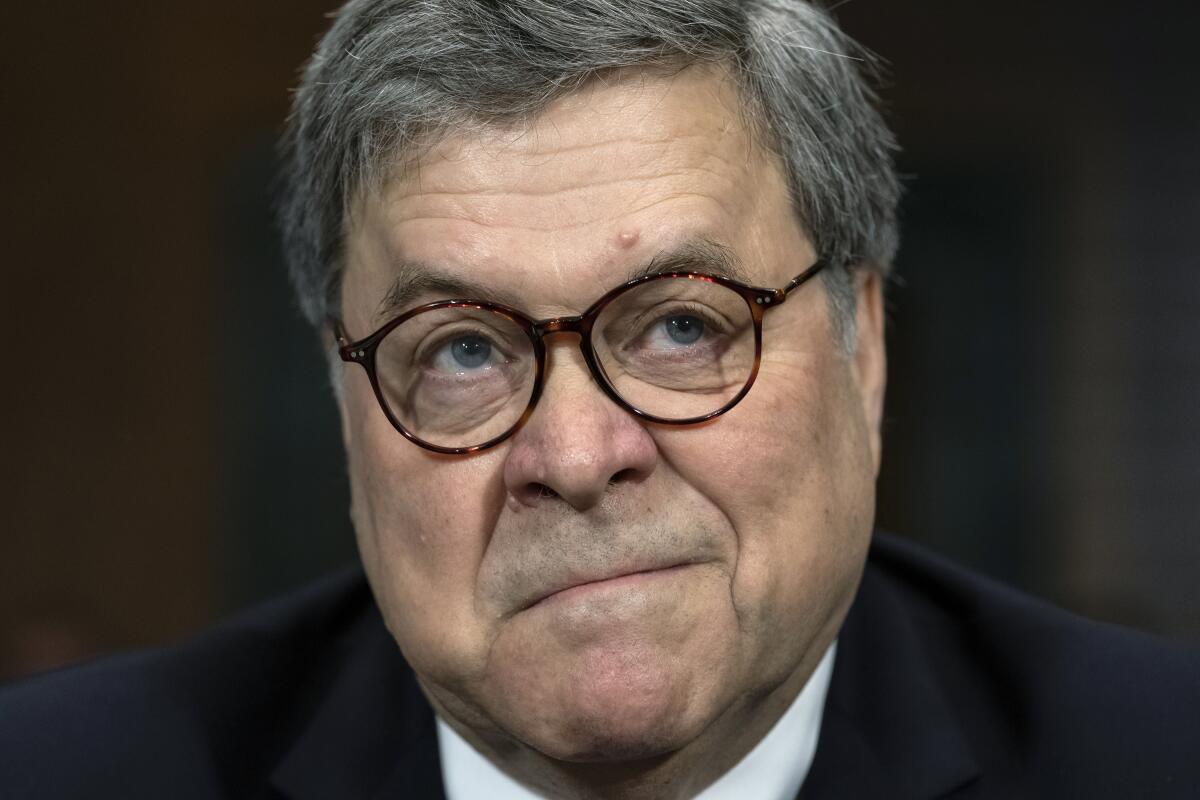Bill Barr says he didn’t overstep in Durham probe of Mueller investigation

- Share via
Former U.S. Atty. Gen. William P. Barr on Wednesday stood by his 2019 appointment of prosecutor John H. Durham to investigate the origins of the inquiry into the 2016 Trump presidential campaign’s connections to Russia, and defended his close interactions with Durham during the probe.
Barr’s comments marked the first time he has spoken to the media since The New York Times reported last week that he pressured Durham to find flaws in the investigation into Russian interference in the 2016 election conducted by Special Counsel Robert S. Mueller III. Barr spoke to a Times reporter after a speech at the California News Publishers Assn. meeting in Sacramento.
“The idea that there was a thin basis for doing it doesn’t hold water,” Barr said of his decision to appoint Durham. “Because it wasn’t started as a criminal investigation. One of the duties of the attorney general is to protect against the abuse of criminal and intelligence powers, that they’re not abused to impinge on political activity, so I felt it was my duty to find out what happened there.”
Barr appointed U.S. Atty. Durham in 2019 just weeks after Mueller’s report was released and tasked him with scouring the origins of the Trump-Russia investigation, including whether the intelligence community was involved in raising questions about what the Trump campaign knew about Russian attempts to interfere in the election. The nearly four-year investigation has concluded after two people charged by Durham were acquitted.
Durham is believed to be working on his final report. Atty. Gen. Merrick Garland will decide how much of the report becomes public.
“I think [Durham]’s going to explain, to the extent he’s allowed to put it out, the whole genesis of [the Russia interference claims] and how it all occurred,” Barr said. “So what’s wrong with that? You review something, you get the facts. Yes, we wanted to hold people accountable if something came up that indicated criminality, or you could prove criminality. But it wasn’t a criminal investigation, it was a review to get the story. And he got the story.”
The New York Times article said Durham’s probe relied on Russian intelligence memos to investigate financier George Soros, a major Democratic donor, and to scrutinize Hillary Clinton. The article also noted that, contrary to the independence special counsels normally take , Barr and Durham often met weekly to discuss the probe’s progress, sometimes over dinner and scotch.
Barr said he didn’t break any department regulations by meeting frequently with Durham.
The New York Times’ reporting also found that Barr and Durham never disclosed that the inquiry had expanded in 2019, based on a tip from Italian officials, to include a criminal investigation into suspicious financial dealings related to Trump. Several news outlets including the New York Times reported at the time that the probe had come to include a criminal investigation, which seemed to indicate that Durham had instead found evidence to support Trump’s accusations of wrongdoing by federal law enforcement.
The specifics of the tip are unclear, and Durham did not bring charges over it. Barr said Wednesday that the tip “was not directly about Trump” and that it was appropriate to fold into Durham’s inquiry because “it did have a relationship to the Russiagate stuff. It was not completely separate from it. And it turned out to be a complete non-issue.”
Barr criticized The New York Times article, which he did not participate in, for omitting what he called “obvious reasons” for Durham’s investigation.
“They ignored some fundamental facts as to why some of the information that Durham was seeking was very important information,” he said.
A spokesman for The New York Times said the newspaper “stands behind this story and the reporting it contains.”
Barr’s criticism of the article was consistent with the theme of his speech to the publishers, which focused on grievances about what he sees as a partisan national media in Washington, D.C., that treats Republicans unfairly.
Wire reported from Washington, D.C., and Rosenhall reported from Sacramento.
More to Read
Get the L.A. Times Politics newsletter
Deeply reported insights into legislation, politics and policy from Sacramento, Washington and beyond. In your inbox twice per week.
You may occasionally receive promotional content from the Los Angeles Times.












